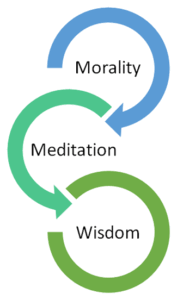In my last post, I shared some reflections from His Holiness The Dalai Lama’s book describing the way of the Bodhisattva, or person on the path toward Buddhahood. Of course, one needn’t choose a monastic life in order to evolve spiritually. The Dalai Lama provides a roadmap for laypersons in How To Practice: The Way to a Meaningful Life.
The Dalia Lama starts at the place of our shared humanity. We all want to be happy and to avoid suffering. In our interdependent world, we serve ourselves and others by cultivating love, kindness, and compassion, and inoculating ourselves against anger and self-centeredness. We realize this state of being through a daily practice that weakens negative thoughts and strengthens positive ones. The resulting inner peace makes room for an external peace that manifests in harmonious relations among people and nations.
Three Ways to Practice: Morality, Meditation, Wisdom
 At its most basic level, morality calls upon us to refrain from physical and verbal actions that harm others – e.g., killing, stealing, sexual misconduct, lying, divisive talk, harsh speech, senseless chatter, covetousness, harmful intentions, wrong views. Be at peace with others; resolve conflicts and misunderstandings. Do not give in to lust, hared, enmity, jealousy, or belligerence. Replace self-centeredness with other-centeredness. Minimize material needs such that more becomes available to give to those in need. Detach from transient pleasures. The Dalai Lama tells us: “Through purification of the afflictive obstructions as well as the predispositions established by them, you can transform your consciousness.”
At its most basic level, morality calls upon us to refrain from physical and verbal actions that harm others – e.g., killing, stealing, sexual misconduct, lying, divisive talk, harsh speech, senseless chatter, covetousness, harmful intentions, wrong views. Be at peace with others; resolve conflicts and misunderstandings. Do not give in to lust, hared, enmity, jealousy, or belligerence. Replace self-centeredness with other-centeredness. Minimize material needs such that more becomes available to give to those in need. Detach from transient pleasures. The Dalai Lama tells us: “Through purification of the afflictive obstructions as well as the predispositions established by them, you can transform your consciousness.”
A regular practice of concentrated meditation helps to focus the mind so that wisdom can take root. Agitation, distraction, and lethargy are obstacles to meditation. The serious practitioner prepares for practice by eating healthfully (preferably whole foods), getting adequate rest, setting aside uninterrupted time in a quiet place for meditation, and adopting a posture that sustains ease and dignity. The practice directs attention to an object (e.g., the breath) with a consciousness that is focused and alert. Through daily practice, one learns to settle the mind and create the space for deep insight and learning.
Wisdom teaching in the Buddhist tradition begins with the acknowledgement that all beings suffer. We suffer physical pain and mental anguish. We suffer in response to unwanted change. And we suffer when the reality of our experience does not match our expectations. The antidote to suffering lies in recognizing that all phenomena lack innate substance; they depend on other conditions for their existence. Life proceeds as a function of cause and effect (karma). Because things do not exist inherently, they cannot be sources of pleasure or pain. Even our own minds change from moment to moment. When we recognize that all is emptiness and selflessness, we take the first step toward freeing ourselves from suffering.
Our busy lives rarely make room for deep reflection and consistent practice to transform our hearts and minds to their highest good. We just put one foot in front of the other and go about our business. But The Dalai Lama reminds us that the good intentions to which we cling in our faith practices do little good if they are not consciously implemented daily. While we may find little to commend them when life is smooth sailing, he tells us:
“When we face unavoidable problems such as sickness, old age, death, or desperate situations, it becomes critical to control your anger, to control your emotional feelings, and use your good human mind to determine how to face that problem with patience and calm.”